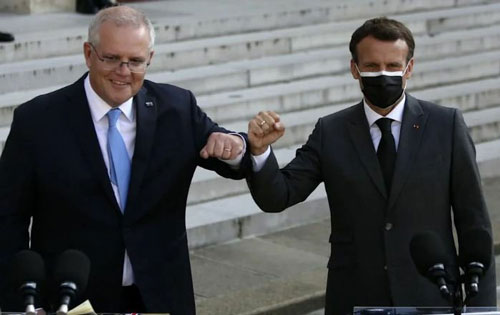Joel Gehrke
French President Emmanuel Macron’s team is outraged at President Joe Biden’s announcement to share U.S. and British nuclear submarine technology with Australia, which scuttles an agreement for Australia to purchase French vessels.
“The American choice to exclude a European ally and partner such as France from a structuring partnership with Australia, at a time when we are facing unprecedented challenges in the Indo-Pacific region … shows a lack of coherence that France can only note and regret,” French Foreign Affairs Minister Jean-Yves Le Drian and French Armed Forces Minister Florence Parly said in a joint statement Wednesday evening.
Their protest cast a Parisian pall over an agreement that American observers hailed as a major strategic advance for Australia and a testament to the power of the U.S. alliance network, in defiance of China’s argument that the chaotic U.S. withdrawal from Afghanistan foreshadows future failures of American support for allies.
Yet, Macron’s government regards the announcement as a breach of trust by Australia and a sign of disrespect from Biden that enhances the need for “strategic autonomy” from the United States.
“The regrettable decision … only reinforces the need to make the issue of European strategic autonomy loud and clear,” the French leaders said.
“There is no other credible way to defend our interests and our values in the world, including in the Indo-Pacific.”
Biden’s team cited the United Kingdom’s involvement in the deal as a mechanism to bring a transatlantic ally into the Indo-Pacific, as U.S. officials try to manage and deter looming threats from China.
“These relationships with Great Britain and Australia are time tested — our oldest allies, generally,” a senior administration official told reporters earlier Wednesday.
“This is designed not only to strengthen our capabilities in the Indo-Pacific but to link Europe, and particularly Great Britain, more closely with our strategic pursuits in the region as a whole … Great Britain is very focused on the concept of ‘global Britain,’ and their tilt is about engaging much more deeply with the Indo-Pacific, and this is a down payment on that effort.”
Biden extended an olive branch to France, the oldest ally of the U.S. while implying the new deal represented an example of London following Paris’s lead.
“Indeed, this effort reflects a broader trend of key European countries playing an extremely important role in the Indo-Pacific,” Biden said.
“France, in particular, already has a substantial Indo-Pacific presence and is a key partner and ally in strengthening the security and prosperity of the region.
The United States looks forward to working closely with France and other key countries as we go forward.”—Agencies








